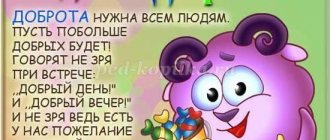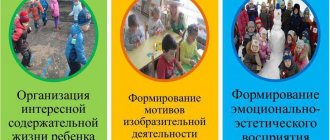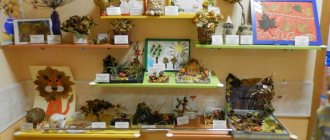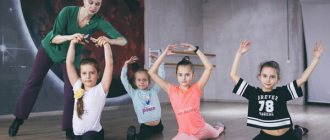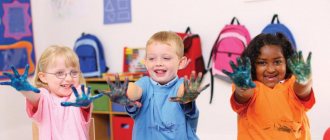Round table with parents
Round table with parents of the senior group on the topic: “Modern educational projects of preschool educational institutions and families for the comprehensive development of the child’s personality.”
Activities:
1. Educational (presentation of information to improve the psychological, pedagogical, legal culture of parents);
2. Practical and effective (increasing parents’ interest in carrying out a common task, demonstrating creative abilities, and full-fledged emotional communication).
- : provide participants with the opportunity to express their point of view on the role of parents in project activities in kindergarten.
Tasks:
- organize education of parents in order to improve their legal and pedagogical culture,
- Involve parents in the educational process, enrich the relationship between parents and children with the experience of joint activities.
Good evening, dear parents! We are glad to see you at our round table. Thank you for coming to this meeting.
This means that we are all united by an interest in the topic of parent-teacher conferences, and it really deserves attention.
From birth, a child is a discoverer, an explorer of the world that surrounds him. Everything is new for him: sun and rain, fear and joy. Everyone knows that five-year-old children are called “why kids.” A child cannot find the answer to all his questions on his own; teachers help him. In preschool institutions, educators widely use the problem-based learning method: questions that develop logical thinking, modeling problem situations, experimentation, experimental research activities, etc. The problem-based learning method is also called the project method.
Many parents transfer the upbringing of their child to a preschool educational institution, perceiving the preschool period as a time that does not require special educational efforts from them, and at home they entrust the child to the TV or computer. Many parents often experience certain difficulties in establishing contacts with children, since they do not have special knowledge in the field of raising and educating children, which forms the basis of the pedagogical incompetence of parents. Thus, quite often children experience a lack of communication with their parents.
What is a project? (parents' answers).
The project method is a way to achieve a didactic goal through a detailed study of the problem (technology), which should result in a very real, tangible, practical result.
Project classification:
Currently, projects in preschool educational institutions are classified according to the following criteria:
By topic and methods of implementing the results: creative, informational, gaming or research
According to the composition of participants: individual, group and frontal.
By implementation period: short-term (1-3 lessons, medium duration (1-2 months) and long-term (the entire academic year).
By type, projects are divided into the following:
1. Creative.
After the project is brought to life, the result is formalized in the form of a children's party.
Research.
Children conduct experiments, after which the results are presented in the form of newspapers, books, albums, and exhibitions.
Gaming.
These are projects with elements of creative games, when children take on the role of characters from a fairy tale, solving problems and tasks in their own way.
Informational.
Children collect information and implement it, focusing on their own social interests (design of a group, individual corners, etc.).
The main goal of the project method in preschool educational institutions is the development of a free creative personality.
The project method is relevant and very effective. It develops creative thinking and imagination, gives the child the opportunity to experiment, synthesize acquired knowledge, creativity and communication skills, which allows the preschooler to successfully adapt to the changed situation of schooling.
Project activity teaches you to “obtain” knowledge on your own.
Preschooler:
- learns to set a task for oneself
- explores various possibilities to accomplish this task
- learns to choose the optimal way to solve a problem
- develops communication skills, since he is required to present his project socially.
Project stages
1. Select a current task that is feasible for children for a specific time.
2. Develop an action plan to achieve the goal: who to turn to for help, what sources to look for, what tool is needed and how to use it.
3. Project implementation: practical activities.
4. Presentation of the project. Summarizing.
At the presentation of projects, children hear the speeches of many children, their knowledge deepens. Stories and works of peers give the child confidence that he, too, can learn and tell everyone something interesting, and create a desire to “obtain” knowledge.
Today, existing methodological developments for organizing project activities are focused primarily on teachers, and parents are assigned the role of observers, although, in our opinion, they should be full participants in the educational process. Widely used forms of work with parents (conferences, homeschooling, conversations, readings, evenings, thematic consultations, etc.) often do not provide the main thing - the joint activity of parents, children and teachers.
Any joint activity is effective, and this is very clearly manifested in projects that represent the embodiment of the joint plan of children and adults. Question: what do you know about family projects? Did any of you take part in them?
A family project is a wonderful opportunity for parents to show their child their interest in their activities, to join the world of their hobbies, and to increase their parental authority (after all, you will be a source of knowledge for your child).
In addition, project activities allow us to establish
purposeful interaction between kindergarten and
parents, in order to improve parent-child relationships.
Harmonization of relations between children and parents during the project
activities occur through:
1. organized comfortable communication between children, parents, teachers;
2. feelings of joy from joint activities;
3. solving problem situations;
4. development in adults and children of independence, initiative and
creative activity.
And as a result, this is the establishment of emotional contact
adult with child.
Expanding the forms of joint activity between a child and adults significantly enriches and harmonizes relationships, allowing them to overcome negativism and disobedience that arise as a reaction to a lack of communication with parents. The effectiveness of project activities depends not only on its form and content, but also on the rational way of organizing children and adults. An adult can be a partner, a teaching assistant, or an assistant in the project.
Depending on the goals and objectives of the project, the degree of involvement of parents in it can be different: parents can help the child find this or that information, make a craft with him, draw a picture, make an appliqué, make a selection of fiction, pictures or illustrative material on the topic of the project . In addition, parents can be involved in the project more broadly, for example, participating with their children in targeted walks and excursions, play activities, experimentation, etc. Parents can be invited to the presentation of the project, show the children’s successes and thus prove the relevance of this method in working with children, as well as the need for cooperation between families and kindergartens in this work. Parents of timid and insecure children can be offered to complete individual family projects, which will help increase their children’s rating in the peer group, as well as add self-confidence and strengthen parent-child relationships.
Thus, family and kindergarten are two important institutions for the socialization of children, two educational phenomena, each of which gives the child social experience in its own way, but only in combination with each other do they create optimal conditions for the comprehensive development of the child.
And now we want to show you an example of a group project that was implemented in March 2014 in the senior group. (presentation)
HOW TO CHOOSE A TOPIC FOR A PROJECT?
You should always consider your child’s interests (what questions does he most often ask:
- What types of cars are there? Why do cars drive?
- Why do dogs bite?
- Why are there so many worms after rain?
- Is it possible to live in space?
- Dinosaurs are the ancient inhabitants of planet Earth.
Try to remember what questions your child asked most recently and what topics can you come up with based on these questions?
The topic of the project can be “suggested” by the activities of children in kindergarten.
This is how the theme of our project presented in the presentation arose.
How can you design a presentation of a family project?
In the form of a collage, album, photograph, multimedia presentation.
Help your child write a story about what he learned and what he will tell the children at the presentation of your family project.
Do you think it is necessary to give a child as much information as possible and deep knowledge beyond his age? (discussion)
If you have difficulty, give an example. (Once one mother proudly told me that her five-year-old daughter reads herself and is interested in books intended for schoolchildren, and can count to one hundred. Mom always adds that her child is precocious) - What is your opinion?
And the girls from the preparatory group will help us understand this issue (presentation of the project about salt).
Showing the skit “Why”.
Discussion of the situation.
Leading:
We all do not want such a situation to develop in our families, to happen to our children.
Please think: what can we do today for our children, not only in families, but also in groups.
The guys and I are approaching you with the idea that every parent should take part in the process of cognitive development of the children of our group.
Discussion of the round table decision.
Now we would like to introduce you to next week's theme (Mother's Day).
Dear parents!
The guys and I have to start working on a new theme “Mother’s Day” in order to learn as much as possible about our dear mothers. We really need everything that will help us learn more about them:
-professions, hobbies,
- works of fiction;
- pictures from magazines or the Internet, photographs;
— board games and coloring books on this topic.
We really count on you!
Discussion of the issue of helping the group in terms of enriching the development environment.
We hope that today you were able to understand and appreciate the importance of teachers using such a developmental teaching method as the project method. We thank you for your cooperation and look forward to your help to achieve common
